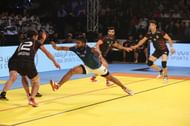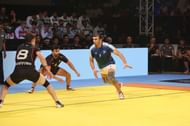Sevn-time defending champions India have been dethroned. Gold medal number eight will have to wait. India's grasp of the gold medal in the men's kabaddi event was not so much broken but violently ripped away by Iran in a dominant performance that saw them overwhelm the Indians 27-18.
Iran's defence, the best in the business, laid a beat-down on India's star raiders to send them packing from the 2018 Asian Games at the semi-final stage. Iran's win is also historic for it means that there will be a first-time winner in this edition, India having won every gold since kabaddi's inception at the Asian Games in 1990.
India started well, sedately building a five-point lead as Iran looked a little nervy. But they eventually shook them off, arrested their slide and fought back to level things up. From then on, the match was a close affair before Iran finally took a commanding lead in the second half by inflicting an All Out.
Mohammad Esmail had an excellent game for the Iranians, putting in smart raids and chipping in with some crucial tackles on the defensive end. Fazel Atrachali, their captain, was excellent too, as always.
No one really covered themselves in glory on the Indian side. It was a collective failure.
Here are the main talking points from the match:
#1 Do-or-Die
The pace of this match was a slow one. From the outset, both teams looked to play on the third raid, now universally known as the Do-or-Die raid. The two teams seemed content to play this strategy.
With Iran, considering how their defence is significantly stronger, it was expected that they would play on their defence while taking minimal risks in the raiding department. India adopting the same approach seemed to signal two things - that they were very afraid of what Iran's defence would do while at the same time signalling that perhaps confidence was a tad low in the Indian raiding ranks.
This strategy from both teams continued almost right through the match, barring the last five minutes where India was forced to step it up as they had a huge deficit to overcome. But it proved to be a bridge too far as Atrachali and his teammates made sure the door remained shut.
#2 India succumb to the Super Tackles

A Super Tackle, a successful tackle made when the defending team has less than four players on the mat, nets that team two points as opposed to one.
Today, Iran employed the Super Tackle to devastating effect to rein in the Indians after India had taken an early lead. Every time India reduced the Iranian numbers on the mat, they used it to their advantage by ratcheting up their defensive intensity a notch higher to make sure that India weren't going to run through them easily.
Iran made six Super Tackles in this match - two on Ajay Thakur, two on Monu Goyat, one each on Pardeep Narwal and Rishank Devadiga - to completely neutralize any momentum that India tried to muster. It initially helped them gain parity on the scoreboard before putting them in the lead.
It was an outstanding defensive showing.
#3 India's raiders a non-factor

Any time Iran and India face off, it is always a battle of India's raiders versus Iran's mean defence. A bit like an unstoppable force meeting an immovable object.
But the force has not quite been with the Indian raiders throughout these Asian Games. In their four group games, India had managed to put up 50 points or more just once while Iran, with a significantly less talented raiding unit, had done it more times.
This contest was always going to boil down to whether India's raiders could find their A-game in this match and bring forth their best effort. Well, they didn't. They weren't allowed to by an exceptional Iranian defence, but notwithstanding their opponents, Ajay Thakur, Pardeep Narwal, Rishank Devadiga, Monu Goyat and Rahul Chaudhari looked short on ideas and bereft of confidence.
Once Iran took the lead especially, India's ability to make a comeback wrested on the raiders' shoulders and they were found wanting. The raiding unit just hasn't sparked into life at these championships and it came to cost them when they needed it the most.
Against Iran's strong shield, India's trusty spear proved rather blunt.
#4 Failure in effecting the All Out

It was a rout towards the end as Iran put daylight between themselves and India towards the closing stages of the match, however, things might have played out very differently had India get on top of the game and seized their moments early on.
India led 6-1 at one stage. Yes, a five-point lead with Iran reduced to just two men - their best defenders in Fazel Atrachali and Abozar Mighani. After two empty raids, Iran's coach made a change, bringing on their super-tall raider Abolfazl Maghsodlou in place of Abozar to go in for the crucial Do-or-Die raid.
India's coach Ram Mehar Singh took a timely Time Out to instruct his players on how to play the situation. He even gestured what exactly he expected Abolfazl to do, emphasizing to India's left corner defender Girish Ernak that he was going to be the point of attack.
Seemingly no heed was paid to Ram Mehar's instructions as Abolfazl did exactly as India's coach had predicted, but Girish committed an error and gave up an easy point. Had they got Abolfazl there, Iran would have been down to one and the All Out would have been a mere formality.
From there, Iran revived themselves and got back on level terms. But it wasn't the only one. In the second half, India started well, picking up the first few points, reducing Iran down to two again. But captain Ajay Thakur was brought down with a Super Tackle that again staved off a potential All Out.
As Iran kept repelling India's efforts, you could see the Iranians gaining in confidence with the Indians getting more and more anxious and tense.
In the end, it was India who ended up getting All Out as Iran broke the game open to take a 24-14 lead.
#5 Out-muscled, out-thought, outfought and outplayed

This match was tied at 9-9 at half-time after Iran had clawed back from a potential All Out. While the action was slow-paced and sedate, one expected India to try and change things up in the second to counter Iran.
Rahul Chaudhari, who looked the best of the raiders in their previous game, looked a possible change that India could make. Yet after netting the first three points of the half, India racked up just five more, two of which came in the final two minutes when the game was truly beyond them.
The way they allowed the game to drift even as Iran kept getting stronger and stronger was almost inexplicable. Rahul was introduced too late for him to have any sort of sustained impact. The Iranians, physically, looked to have the edge over the Indians as their defenders were able to absorb impact and still keep India's raiders down.
Iran's tactics were better than India's; the Indians looked like they didn't have a plan at times. By the end, they were swamped and thoroughly outplayed by Iran in all departments, including the raiding department.
This one will sting for Indian kabaddi not because they lost, but rather the manner in which they lost. It was in the end, a tame surrender, as Iran outscored them 18-8 in the second half to bring their campaign to a screeching halt.